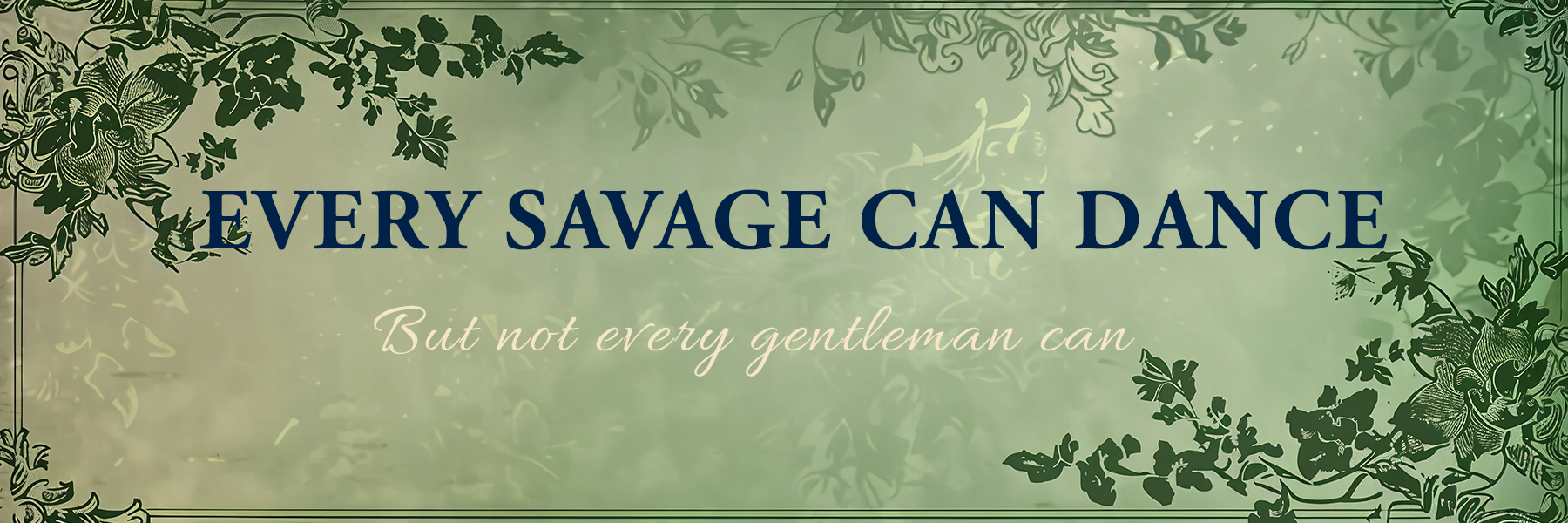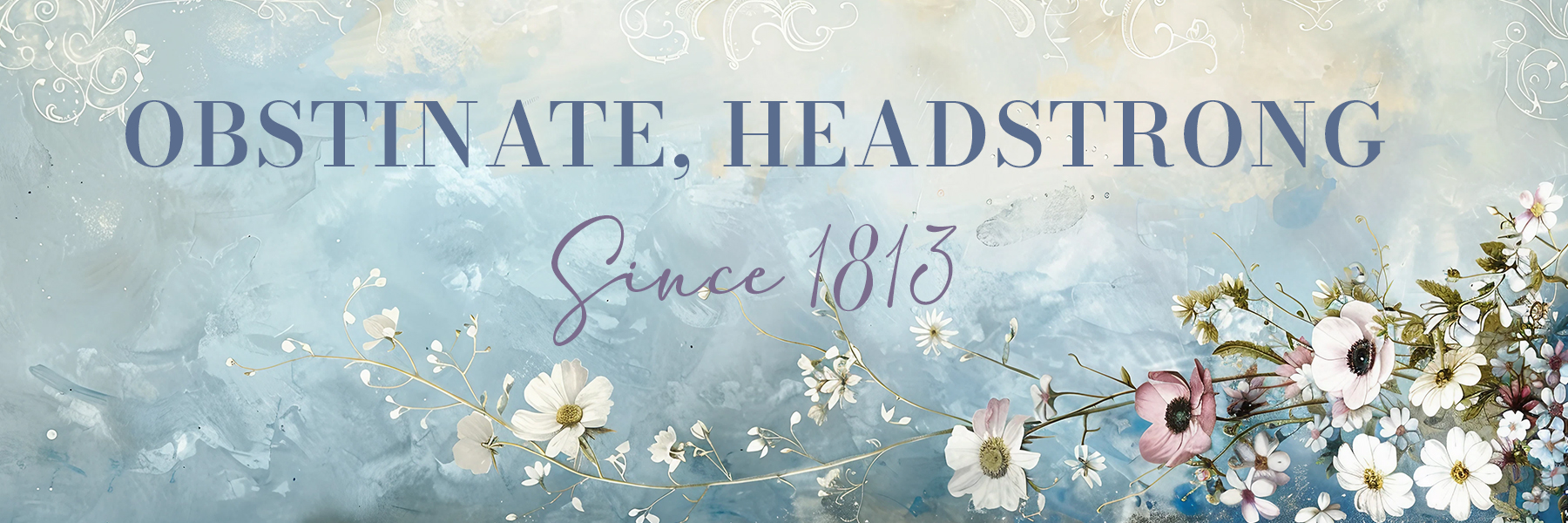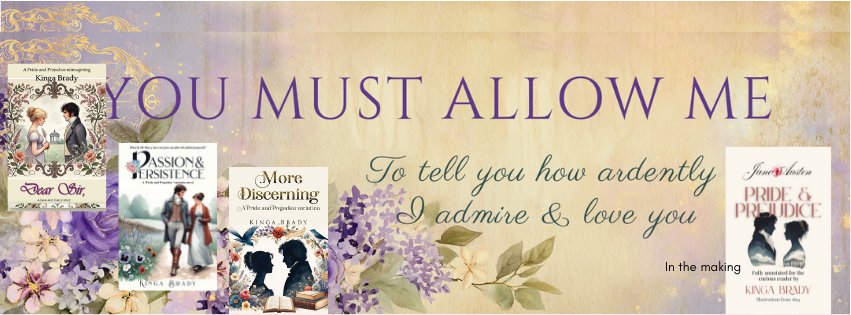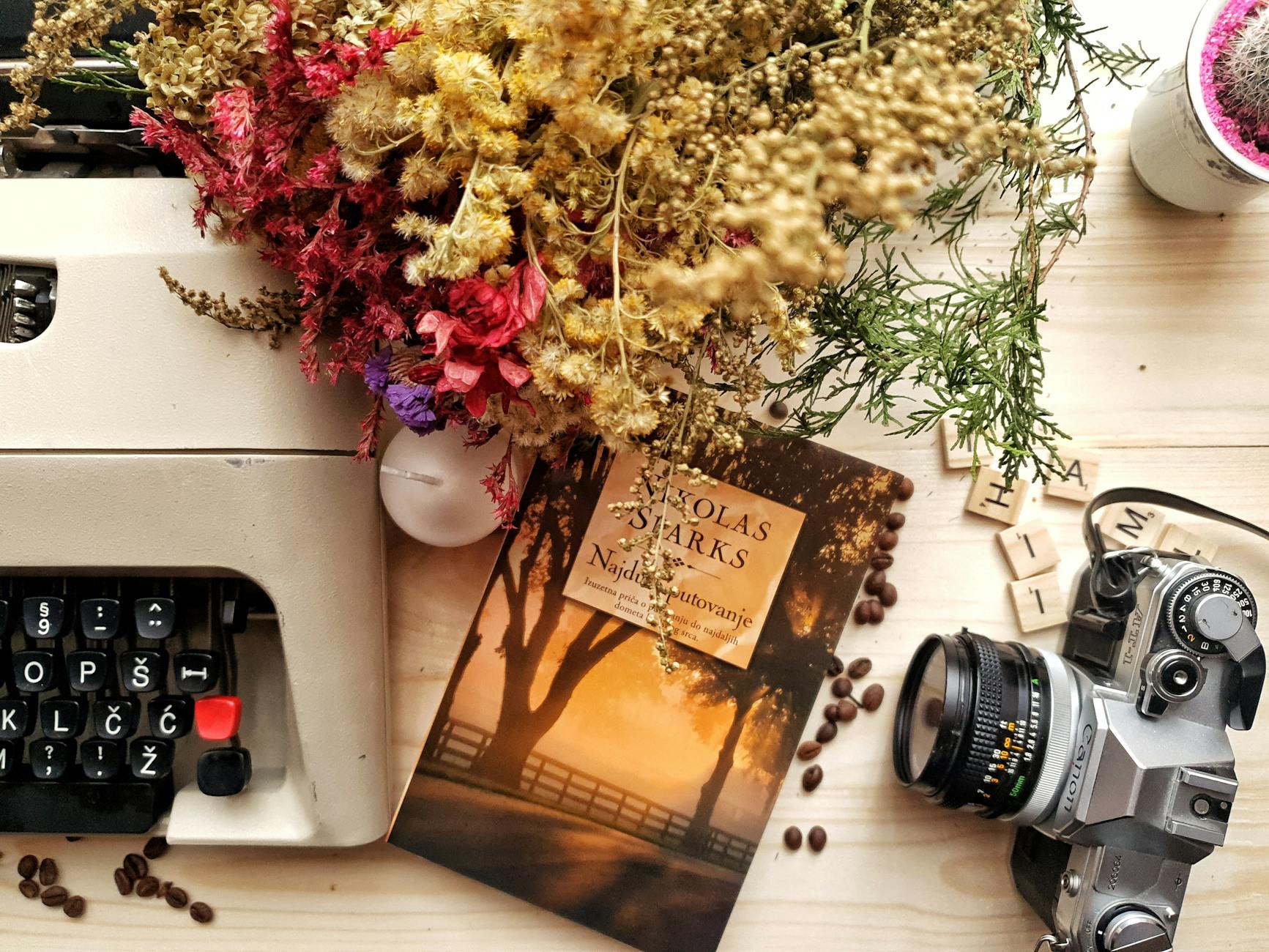UNDER CONSTRUCTION
My fourth P&P variation novel is going to be about...
Do you recall that before the Netherfield ball, there were four days of rain and nobody could go anywhere?
Well, my variation is going to change that.
What if there were four days of good weather before the ball? How would that change things?
Below are my first drafts of the first chapters - any thoughts?
You may contact me at gykinga@yahoo.co.uk

"Add your slogan here"
Four Days of Good Weather
by Kinga Brady
Chapter 1
Preparations and Prejudices

Friday, 22. November
Mrs. Bennet awoke unusually early, for the sun, streaming with uncommon brightness through the chintz curtains, would not allow her the pleasure of slumbering longer. Her husband, Mr. Bennet, was still asleep, though he often had dressed and sat at this desk before she went downstairs.
She lay for a few moments, her mind fluttering between the agreeable remembrance of yesterday's visit and the delightful prospect of the days to come. A real ball, at Netherfield! Her mindquickly reviewed her daughters' wardrobes to see what needed to be done. No mother in the neighbourhood could compete with her when it came to her daughters. Everybody would be at the milliner's before the day was out, she thought. Thankfully, in her mission to advantage her daughters, she had purchased the best her pin money could buy. Besides, she always had a cupboard full of linen, lace and ribbons, pearls, and silk roses that would make the village milliner envious. The collection was as old as her first daughter was born. She kept it under key and used it when needed. Her daughters, in their surprise, never questioned where the treats had come from.
Mr. Bingley, such a charming man! He had stood by his word. Good Heavens! All that expense to fulfil a girl's request. It must be for Jane. What other inducement would do? And to top it all, the Netherfield party, and Mr. Bingley himself no less, had condescended to bring the invitation in person. It was an honour she could not cease to turn over in her thoughts. How many ladies in the neighbourhood could boast the same? None, surely.
Propped upon her pillows, she smiled to herself and began to consider how best such distinction ought to be acknowledged. Mere thanks would never do. No, something more was required, something that might impress upon Mr. Bingley and his sisters the gratitude of the Bennet family – and perhaps confirm to them the wisdom of attaching themselves to it more permanently. A dinner, yes! Everybody praised her table. A handsome dinner at Longbourn, and as soon as possible, before the ball should take up all the conversation. Saturday evening would do exceedingly well.
Already she could picture the table groaning beneath a profusion of dishes, Mr. Bingley seated beside Jane, Caroline Bingley obliged to admire the abundance of the repast and her silver candlesticks from London, and Mr. Darcy – well, she would find a place for him too. However, he need not be her concern.
The vision was so pleasing that she clapped her hands together in the bed, to the astonishment of Mr. Bennet, who muttered from his own pillow that he hoped such early industry would not ruin his breakfast.
Mrs. Bennet paid him no attention. He must be tired after his exertion the previous night, she mused with a smile on her face. Her head was now full of matters more important: menus and invitations, and she determined, the very instant she quitted her chamber, to set Hill upon the business.
Mrs. Bennet dressed with unusual despatch, for her head was so full of dinners and Netherfield that she scarce had patience for cap or kerchief. Before Hill had a chance to gather up the discarded ribbons, she was already descending the stairs into the small parlour she claimed for her own affairs. The great round table stood ready, covered with patterns, stray needles, and scraps of old menus; but she brushed these aside, seized a sheet of paper, and began to write as if all Hertfordshire depended on her pen.
"First, Mr. Bingley," she murmured, speaking half aloud, for she loved an audience even when she had none. "He shall sit by Jane, and no power on earth shall separate them. His sisters, of course, and Mr. Hurst – though he eats more than he speaks. He likes the ragout, Lizzy had said. And Mr. Darcy – well, I cannot do otherwise, however proud he may be. He must be seated close to the head of the table. He must see with his own eyes what good connections we make."
Her pen scratched furiously, blotted, scratched again.
"Then our own household – Mr. Bennet, myself, and all five girls. Lydia will be wild to sit near the officers; well, we shall see the numbers. Now, should I ask Sir William and Lady Lucas? Yes, certainly – it would not do to leave them out, and Charlotte, she will not take away the attention, poor girl. Mr. Collins! Oh, he must be included, for the honour of his noble patroness. That will please him beyond reason, and the Bingley party will see we have clergymen in the family."
She paused, tapping the pen against her teeth. "Mrs. Phillips…perhaps not. She is my sister, to be sure, but she brings too much of Meryton's gossip with her. Better leave her for another time."
She paused, counting on her fingers, frowning at the oddness of the numbers. 'A hostess must be attentive to these things' – she had heard it often said. "Six gentlemen, ten ladies? That will never do." She tapped the pen against her teeth, then brightened suddenly. "The officers! Yes, Lydia and Kitty speak so warmly of Mr. Wickham and Mr. Denny. And if we have the Colonel too, that makes three more gentlemen – and so handsome they will look at the table, the scarlet set against our best damask."
She hastily wrote down the names and then realised that although the balance was better, a gentleman was still missing. She decided on the vicar to fill in the list. There, ten gentlemen and ten ladies – nothing could be more correct. What a sight it will be when they are all arranged about our table, the Bingleys and Darcy, Mr. Bennet and our girls everywhere admired between. The Lucases will die of envy.
Having settled the matter, she leaned back with a satisfied air, the list before her blotched and triumphant, and rang for Hill to carry word to the kitchen that a dinner of true distinction was to be prepared for Saturday evening. She took her wooden box containing her menu cards.
"Hill, Hill! Make haste! Send Mary to wake Kitty and Lydia. How they will like my news. Hill!"
At that very moment, the parlour door opened, and Elizabeth stepped in, her cheeks bright with the freshness of an early walk.
Mrs. Bennet started, then frowned. "Lizzy! Out already? And in the damp morning air! When will you give up this unladylike behaviour? You will catch your death of cold, and what is to become of me if you are in bed sniffing your nose just when I want you most? Go upstairs and get warm at the fire. But before you go, you shall play the piano tomorrow evening. Jane must join you with her sweet voice, and then, oh, then, Mr. Bingley will be quite undone. He will fall in love with her on the spot, if he has not already."
Elizabeth removed her gloves with great composure. "Saturday evening, Mama? What is happening then?"
Mrs. Bennet all but dropped her blotched paper for eagerness. "A dinner, child! A grand dinner at Longbourn, in honour of Mr. Bingley and his dear sisters, and all the Netherfield party, with officers too, and Mr. Collins besides. Ten gentlemen and ten ladies – nothing could be more exact! Charlotte and her family will also be invited. We shall shine, Lizzy, we shall shine as never before, and the Lucases will choke with envy when they hear of it."
Elizabeth bit her lip, half amused, half resigned, while Mrs. Bennet pressed the bell again for Hill, declaring that not a moment was to be lost in giving orders to the kitchen.
Elizabeth left her mother, who was still full of her imagined triumph, and went upstairs, escaping the flurry of orders and menus. In her chamber, the hearth was cold, the small blaze of the night before long extinguished. She stooped to lay a few sticks, coaxing them into flame until a gentle warmth spread once more. Settling in the chair by the fire, she let her thoughts wander over her mother's plan.
A dinner at Longbourn. She could not help but smile at the bustle it would produce – the dishes, the rearrangements, the fluttering of her sisters. Elizabeth was, in essence, a sociable creature. She flourished in society. Yes, she needed her escape sometimes, but she enjoyed gatherings; after all, she loved to laugh.
Her mother was an eager strategist, such as when she made her own daughter leave on horseback, knowing it was going to rain. It was heartwarming, though, to see how Mr. Bingley fretted around her sister the evening she brought her down after dinner. This dinner may be one of her better ideas, she thought. Mr. Bingley was enthusiastic in nature, but a little help to bring him and Jane together could indeed help them fall more in love.
Yet one idea would not leave her: Mr. Wickham and Mr. Darcy, seated under the same roof, at her father's table. What would it be like? A scene of civility forced and strained, or the cold disregard of two men whose histories were too bitter to be softened by courtesy?
Her heart, still warm with the memory of Mr. Wickham's openness and his account of past wrongs, quickened with indignation at the thought of Mr. Darcy presiding with all his hauteur. How blind must Bingley be, that he could so esteem such a friend! And yet, a dinner at home, with both men before her, might give her eyes the confirmation she needed. She would watch Darcy's countenance; she would see the truth in his very look.
But even as she thought of it, her mind returned with
indignation to the story itself. How was it possible that a man of Mr. Darcy's
station – of education, fortune, and consequence – could so grievously wrong a
friend's son? To deny him the living that had been promised, to cast him adrift
without provision or regard, and all out of sheer pride and jealousy! The very
contrast struck her: that Wickham, with so much frankness and good humour,
should be left dependent upon his own efforts, while Darcy, with every
advantage, seemed determined to employ his power only to mortify and oppress.
It was enough to make her quite resolved that no amiable exterior could ever
atone for such a defect of principle.
Truth be told, she still smarted from his comment at the assembly, and she was
equally mortified that he thought him handsome at first.
Drawing her shawl closer about her, Elizabeth leaned back and allowed the flames to dance in her vision, mingling with her own rising curiosity. Saturday evening promised amusement enough, though perhaps not always of the comfortable sort.
Elizabeth's heart was at ease; she doubted nothing and anticipated with perfect confidence the scene to come. How fortunate it is that young ladies are so often possessed of perfect confidence, for without it, they might be robbed of half their entertainment.
***
Elizabeth quickly changed into her morning dress, a more delicate one that was better suited for the indoors, leaving the back open for now. With her usual light step, she ran and tapped at her sister's chamber door. Not waiting for an answer, she slipped in and found Jane still curled beneath the coverlet, the pale November sunshine just beginning to reach across the floor.
"Jane, wake up! There is news to rouse even the soundest of sleepers. Mama is already in a flutter, and it concerns you most particularly."
Jane stirred, pushing back her hair with a sleepy smile. "What is it, Lizzy? Pray, do not make me guess before I am properly awake."
Elizabeth perched on the edge of the bed, eyes alight. "A dinner, tomorrow evening, here at Longbourn. Mama has determined to do so, in gratitude for Mr. Bingley's invitation, and she is already planning how best to shine. And do you know what she decrees? That you must sing – and I must play for you."
Jane sat up at once, colouring. "Oh no, Lizzy. I had much rather not. You know I never like to put myself forward. Besides, my voice…"
"…is lovely," Elizabeth finished firmly, taking her hand. "Do not deny it. You may be shy, but Mama will never be dissuaded once she has made up her mind. Better that we choose the song ourselves, than wait for her to thrust one upon you. I will play the accompaniment, and you shall sing something simple and sweet. We shall practise. It will charm them all, and no one more than Mr. Bingley."
Jane blushed deeper and shook her head, though the smile betrayed her. "Lizzy, you tease me cruelly. Mr. Bingley is civil to everyone."
"Civil?" Elizabeth laughed. "If that is civility, then I wish more men would learn the art. I daresay his eyes hardly leave you when you enter a room. Sing tomorrow, dearest, and you shall see whether he applauds out of mere civility or something more."
Jane pressed her sister's hand with quiet affection. "You will only make me more nervous."
"Then I will sit at the pianoforte and make you laugh with a sour note or two, and all the solemnity will vanish. Between us, Jane, we cannot help but please." She turned her back to her sister. "Could you tie my dress?"
With that done, Elizabeth jumped up, full of mischief, while Jane, still blushing, resigned herself to the certainty that her sister's prediction – and her mother's scheme – would both be fulfilled.
As she fell back on her pillow, she smiled at the prospect of having the Netherfield party for a whole evening. She recalled with affection how he took care of her in the Netherfield parlour when she went down after dinner. He paid attention to her exclusively. And remembered with joy how he looked at her when they brought the invitation. Before they left, he stepped to her side and quietly said.
"I will have to dance the first with my sister as hostess, but can I have your second set?"
To her ears, that meant that his duty notwithstanding, he would have wanted to dance the first dances with her. To be asked for the first dance was a distinction universally felt; it marked, beyond all casual civility, the lady most particularly in a gentleman's favour, and was seldom forgotten by those who witnessed it. She determined to see if he would ask her to dance again, just as he did at the assembly. That would tell her of his preference.
***
By half past nine, the family had gathered in the breakfast-parlour, where the table was laid with fresh bread, cold ham, eggs, and the little dishes of preserves Mrs. Bennet liked to boast of to her neighbours. Mr. Bennet sat with his usual dry composure behind the newspaper, while Mr. Collins, already furnished with a plate piled high, was describing at length how Lady Catherine preferred her toast cut.
Mrs. Bennet, unable to keep her triumph to herself a moment longer, clapped her hands together. "Now, my dears, I have news for you all! We are to have company at Longbourn tomorrow evening. A dinner – a handsome dinner – in honour of our friends from Netherfield. Mr. Bingley himself, his sisters, Mr. Darcy, all the party. And, besides, I plan to invite the Lucases, Colonel Forster, Mr. Wickham, Mr. Denny, and – of course – you, Mr. Collins," she added, as if bestowing a prize.
Mr. Collins felt all the gratitude for being included in such an event. He was about to mention how many times he had dined at Rosings, which experience had totally prepared him for any social event, but Kitty and Lydia cried out together, their voices carrying clearly over the clatter of cups. "Wickham! Denny! The Colonel, too!" They fell into a flutter of anticipation over scarlet coats at the Longbourn table.
Jane blushed at once and bent her eyes upon her teacup. Elizabeth, catching the expression, smiled mischievously. "Only think, Jane. Mama has contrived it so you may not only dance with Mr. Bingley at the ball but sing to him in our very parlour."
"Lizzy, do not tease me," Jane whispered, though her colour deepened prettily.
Mrs. Bennet, however, was delighted. "Yes, indeed! Jane shall sing, and Lizzy will accompany her. Nothing could be more elegant. Mr. Bingley will be transported, I am sure of it."
Mary, who had been waiting with solemn eagerness, now interposed: "If music is required, I shall also be ready to perform. A selection of my hymns would give the occasion a proper dignity."
Mr. Bennet folded his paper at last, his eye glinting with mischief. "Indeed, my dear, nothing could better enliven the spirits of Mr. Bingley than a hymn or two to remind him of eternity. I only hope he will not carry Jane straight to the altar in gratitude."
Elizabeth bit her lip to hide a laugh, while Jane, half-smiling, half-distressed, murmured a protest.
"Mary, why do I not help you choose an uplifting piece. This is going to be a sort of celebration of our neighbours, and a hymn may serve as a counterproductive element." And she smiled at her in such sweetness that Mary could only nod.
Mrs. Bennet would hear none of it. "Now, Mr. Bennet, do not be provoking. We must all do our best. A dinner at Longbourn will show Mr. Bingley the merit of our family, and if I know anything, he shall be quite undone by it. Yes, Mary, play something uplifting."
Mr. Collins, after a solemn pause, declared that such plans were in every way suitable to the honour of the house, and that he would write immediately to Lady Catherine to assure her of the excellence of her relations.
Elizabeth, unable to restrain a laugh, thought only that the following evening promised more than enough amusement, even without Lady Catherine's approbation.
"I suppose you will ask me for funds for this promising event, my dear. I only hope the expense of feeding half the regiment and all of Netherfield will not leave us obliged to sup on cold mutton for the rest of the winter."
Mrs. Bennet, quite unshaken, cried, "Nonsense, Mr. Bennet! It will be the finest dinner Longbourn has ever seen, and it shall pay for itself a hundred times over when Jane is mistress of Netherfield!"
Elizabeth caught her father's eye across the table; the shared look between them was amusement enough to sweeten her tea.
"Kitty, finish your meal and meet me in the backroom. I would like you to write the invitations. John will need the horse, Mr. Bennet, to take them."
Chapter 2
Restless Reflections

The same morning Mr. Darcy set out on horseback, eager to breathe the clear air and rid himself of the disquiet that had troubled his rest. Usually quite a good sleeper, of late, some uneasy current in his thoughts denied him the comfort of undisturbed slumber. It was not the management of Pemberley – that was ever on his mind, but never a torment. His estates were well-ordered, his tenants loyal, his steward capable. Nor was it Georgiana, whose welfare was his first concern, for she was safe at home, tenderly cared for by Mrs. Annesley. Her last letter gave hope that she was letting the past go. No, the source of his unrest was of another sort, and he disliked to own it even to himself.
He had spent too many hours tossing from one side to the other, compelled to revisit scenes that should have held no consequence for him: a crowded assembly room in Meryton, the lively murmur of provincial voices, and among them a lady whose quick wit and unguarded eyes seemed to challenge his every reserve. Elizabeth Bennet had crossed his path but briefly, and yet her presence lingered with a pertinacity that surprised and vexed him. What was she to him, that her laughter should intrude upon his solitude, or her look of indifference trouble his composure? He had endured the weight of public notice all his life, had stood immovable before admiration and censure alike, and yet one country miss had succeeded in shaking his rest.
Darcy urged his horse into a brisker pace, as if motion itself might scatter these thoughts. The fields stretched wide about him, touched with frost and sunlight, but the freedom of the open air did not entirely quiet his mind. He was not a man accustomed to weakness, least of all in the governance of his own reflections, and the novelty of it was almost more offensive than the cause.
The morning air seemed a better cure than any further tossing upon the pillow. The country, bathed in late-autumn sunlight, lay before him in sober beauty, the fields touched with frost, the hedgerows gilded with the season's last leaves. Riding always steadied him; it recalled the long discipline of his youth, the weight of estate and family that had fallen upon him so early, and the solemn promise he had made to himself never to fall short of the expectations bound to his name.
Yet even here, with the rhythm of his horse beneath him, his thoughts strayed where he had least intended. The memory of Miss Elizabeth Bennet rose unbidden – the arch of her brow when she caught his eye, the liveliness in her manner, the very readiness with which she would say something mocking. She would do it with such an innocent expression that nobody caught her.
He recalled when she essentially likened Miss Bingley, Mrs. Hurst, and him as a group of cows on the path. She did not want to ruin the picturesque, she said. The ladies had no idea of the insult. He shook his head. He found it intriguing that she had known about Gilpin's idea of the power of groups of three as desirable for aesthetic purposes. How many young ladies in Hertfordshire even thought of such things? Or elsewhere. He told himself it was no matter: a gentleman of his position ought not to be swayed by a country miss, however fine her eyes. And yet, he had not forgotten them.
It puzzled him more than he cared to admit. He had been admired often enough, courted for his fortune, his name, his consequence. He knew many ladies considered him handsome. It was a new thing to find himself the object of indifference, or worse, of disdain? She had refused to dance with him, not once, but twice. He could not figure her out. Nobody had ever done that. That recollection pricked his pride, though strangely it did not chill his curiosity. Rather, it heightened it.
It did occur to him that Miss Elizabeth had appeared so inappropriately at Netherfield to forward herself in his eyes. But then, he argued inwardly, would she not have made sure she was presented immaculately? Not that her appearance injured her in his eyes. He was a man, and he rather enjoyed her complexion. Her state of dishevelment affected his male awareness. But he was sure she did not intend that. Also, she spent most of her time with her sister instead of downstairs, so the idea that she wanted to impress him did not seem to be the case.
She was quite unpretentious, confident, and witty. He found her person beguiling. There had been that walk at Netherfield – when he had jested, awkwardly enough, that they sought only to display their figures. She had answered him with such a look, half-mocking and half-playful, that for an instant he could not decide whether she teased or encouraged him. It was not the sort of exchange he was accustomed to having with women, nor was he sure what it meant, but that he had been drawn into it at all astonished him still.
Darcy tightened the reins, impatient with his own weakness. He had duties beyond Hertfordshire, duties to Pemberley, to Georgiana, to the generations before him. He was not free to indulge fancies, however appealing. Still, as he turned his horse along the rise, he caught sight, far in the distance, of a slight figure walking across the meadow path. The briskness of her step, the graceful carriage – he knew it instinctively. Miss Elizabeth.
He watched without thought. He could do that. He did not approach; he had no reason, no right. But as he paused upon the crest of the hill and looked down, he felt an unwelcome warmth stir within him – a mixture of curiosity, vexation, and something more tender that he dared not name. He pressed his heels to his horse and moved on, yet the image remained: her figure outlined against the pale November sky, imprinted upon his thoughts with a force that no sense of duty could quite efface.
Darcy submitted himself to his valet with less patience than usual. The scrape of the razor, the rustle of the brush, the faint sting of soap – all these were things he commonly bore without thought, but this morning he found them intolerably slow. The mirror gave back his own features, steady and composed as ever, yet his mind was far from tranquil.
It has been three days since he last saw Miss Elizabeth. Even then, he never spoke to her. A glance, a look into each other's eyes. And then…
Wickham.
Why now, why here? Of all places to cross paths, it must be Meryton's narrow street, and at Elizabeth Bennet's very side. Darcy recalled, with a tightening of his jaw, the moment their eyes had met. The colour had drained from Wickham's face; the coward, on the other hand, had mastered his anger in an instant. Wickham had saluted with insolent ease, from behind the ladies, as if to remind him that the past was not so easily escaped. And Elizabeth – she had been there, watching.
He adjusted his cravat before the glass, his movements precise, as though order in dress might restore order in thought. But the effort was vain. He saw again her astonishment as she looked between them. Of course, she would be curious. She would wonder at the sudden change in their countenances, the coldness of their bow. And Wickham, with his practiced charm, would not fail to offer her some tale. A tale turned to his own advantage, blackening Darcy's name while winning her sympathy.
For a moment, he considered: ought he to warn her? A word of caution might prevent her from being deceived. But no. To speak would be to drag her into a history she had no claim to share, a history painful to himself and mortifying to his family. He could not expose Georgiana, nor would he condescend to defend himself before a young lady whose opinion should mean nothing to him.
And yet it troubled him, more than he would confess, that she might think ill of him. She, with her clear eyes and her lively mind, whose judgement already seemed too quick to condemn him. He pulled on his coat with a sharper motion than was necessary, fastening the buttons as though each were an act of resistance. He would be silent. Wickham might whisper what falsehoods he pleased; Darcy would not descend to contradict them. He did not owe anybody an explanation. Still, the thought of Elizabeth's regard being turned against him lodged like a thorn beneath his composure, small yet inescapably sharp.
***
Darcy descended to the dining-room to find Bingley already at table, cheerful as ever over ham and eggs, and Mr. Hurst comfortably occupied with his plate, speaking little, save to request the claret. Darcy seated himself, offering the ordinary civilities, and took coffee.
"You were out early, Darcy," Bingley said, his face alight. "I never saw such a fellow for riding. Do you find the Hertfordshire air invigorates you?"
Darcy allowed a half-smile. "It is fresh enough."
"That is a recommendation in itself," Bingley replied, cutting his toast with brisk contentment.
Hurst gave no opinion, save a grunt of satisfaction as he applied himself to the dish before him.
It was not long before Miss Bingley swept in, her voice preceding her with its usual music of complaint. "I protest, this country air will be the ruin of my complexion. Louisa, do you not feel the same?"
Mrs. Hurst, who followed in a more languid state, assented with a graceful sigh. "Indeed, Caroline, I should prefer Grosvenor Street to all Hertfordshire combined."
Bingley laughed and welcomed them both to the table. "You are unjust! I find the neighbourhood full of cheer and civility. Why, every day we receive some fresh kindness."
As if to confirm him, a servant entered with a letter. Bingley took it up, broke the seal, and read with visible delight. "An invitation! From Mrs. Bennet of Longbourn. A dinner for tomorrow evening, in gratitude, I suppose, for our own little scheme."
Miss Bingley raised her brows and cast a glance at Darcy. "A dinner at Longbourn. My dear Charles, I cannot imagine Mr. Darcy will think it a suitable amusement. He is not used to such provincial society."
Darcy looked up from his cup with composure. "On the contrary, Miss Bingley. One ought to honour the attentions of one's neighbours, wherever one resides. Hospitality is not measured by fashion."
Bingley beamed at him. "There, you see? We must certainly go. Jane will be pleased…that is, Miss Bennet. It will be most agreeable."
Caroline bit her lip and offered no more, but her glance, first at Darcy and then at her brother, betrayed her vexation that either should think of Longbourn as anything but a bore.
Darcy returned quietly to his breakfast, his face unreadable. Yet inwardly, he was a little astonished at himself. Was it truly a sense of neighbourly duty that had prompted his reply, or the wish to cross Miss Bingley in her officious certainty? Or – and here he would not linger – was it the sudden thought of Elizabeth Bennet, and the prospect of meeting her again? He dismissed the question with impatience, but it would not be so easily silenced.

Other books by Kinga
Dear Sir, - A Jane and Darcy story, after Hunsford. You may say it is a big twist, but give it a try. Elizabeth finds her own Mr. Darcy. I promise.
Passion and Persistence - What if Darcy did not give up after Hunsford?
More Discerning - how clearer insights would change the whole story, starts at the Meryton assembly
Pride and Prejudice - a new edition with footnotes and chapter analysis, and essays - in the making
Experience Regency romance through literature.
Welcome to Four Days of Good Weather, your source for captivating Regency Romance novels and Pride and Prejudice variations, written by author Kinga Brady. Immerse yourself in the world of Jane Austen and let us transport you to a world of love, wit, and charm.



Passionate about Regency Romance
Four Days of Good Weather is a website dedicated to showcasing the works of Kinga Brady, a talented writer specializing in Regency Romance and Jane Austen's Pride and Prejudice. Based in Grimsby, Kinga's books transport readers to a world of love, wit, and charming characters.
"Regency Romance Novels"
Welcome to Four Days of Good Weather, the website for writer Kinga Brady. Specializing in Regency Romance and Jane Austen's Pride and Prejudice variations, we offer captivating and engaging stories for fans of historical romance. Located in Grimsby, our goal is to transport readers to the world of Jane Austen and provide a delightful escape through our books.
1. Manuscript editing
Manuscript editing is the process of refining and perfecting a written document before it is published or submitted for review. It involves carefully reviewing and revising the text for grammatical errors, spelling mistakes, punctuation, and overall clarity and coherence. The goal of manuscript editing is to polish the writing and ensure that the ideas are effectively communicated to the intended audience. This process is essential for all types of written works, including books, articles, reports, and academic papers. A skilled manuscript editor not
2. Book formatting
Book formatting is the process of arranging and designing the visual elements of a book, such as page layout, font styles, and images. It is an essential aspect of book publishing as it ensures that the final product is visually appealing and easy to read. Book formatting involves making stylistic choices that enhance the overall reading experience, such as choosing the appropriate font size and type, adjusting the spacing between lines and paragraphs, and incorporating illustrations or graphics. It also involves organizing the content in a logical and coherent
3. Social media promotion
Social media promotion is a marketing strategy that utilizes various social media platforms to increase brand awareness, drive traffic to a website, and ultimately boost sales. With the widespread use of social media platforms such as Facebook, Instagram, Twitter, and LinkedIn, businesses can reach a large and diverse audience with ease. Through targeted advertising, engaging content, and strategic use of hashtags and influencers, social media promotion allows businesses to connect with potential customers and build relationships with their current audience. This form of promotion also allows for
Regency Romance Variations
At Four Days of Good Weather, we specialize in crafting captivating Pride and Prejudice variations that transport readers back to the enchanting world of Regency England. Our books are meticulously researched and beautifully written, providing a fresh and unique take on the beloved characters and story.
Capturing Literary Inspiration
Our photo gallery features stunning images from the beautiful countryside and grand estates that inspired Jane Austen's Pride and Prejudice. You can also catch a glimpse of our upcoming book, "Four Days of Good Weather," a thrilling variation of this beloved classic. Join us on a visual journey through the world of Regency romance and immerse yourself in the world of Elizabeth Bennet and Mr. Darcy.